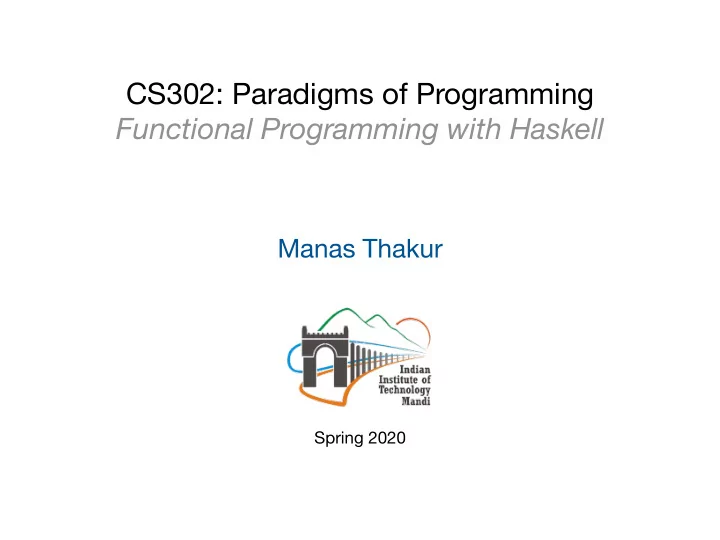

CS302: Paradigms of Programming Functional Programming with Haskell Manas Thakur Spring 2020
Last Two Weeks of PoP • Culmination of whatever we have been learning • Recall this slide? 2
What’s a function? • A map from values in a domain D to values in a range R . f :: D -> R • Examples: sin :: Float -> Float age :: Person -> Int add :: (Integer,Integer) -> Integer • Applying a function: f(x) sin OR sin( )? θ θ Haskell: f x 3
Function composition f :: Y -> Z g :: X -> Y • What is f . g ? f . g :: X -> Z (f . g) x :: f (g x) • All this is Haskell code! 4
haskell.org 5
Common Words the: 154 of : 50 a : 18 and: 12 in : 11 … … n entries 6
Type declaration • What’s the type of input? • An integer Int, [Char] • A list of characters • What’s the type of output? [Char] • List of characters again! • What’s the type of commonWords ? commonWords :: Int -> ([Char] -> [Char]) Functions in Haskell are curried! 7
Possible algorithm • Get words from text • Count occurrence of each word • Sort in decreasing order • Display 8
Type synonyms • Get words from text words :: [Char] -> [[Char]] type Text = [Char] words :: Text -> [Word] type Word = [Char] 9
Higher order functions • Should “The” and “the” be counted as same or di ff erent? • Solution: Convert each letter to lowercase! • Can you identify a function just by looking at its type signature? What? :: (a -> b) -> [a] -> [b] map :: (a -> b) -> [a] -> [b] map toLower :: Text -> Text Currying again! 10
One of the most remarkable ideas in programming • Count occurrence of each word • Sort first? sortWords [“to”, “be”, “or”, “not”, “to”, “be”] = [“be”, “be”, “not”, “or”, “to”, “to”] sortWords :: [Word] -> [Word] • Count adjacent runs of each word: countRuns [“be”, “be”, “not”, “or”, “to”, “to”] = [(2,“be”), (1,“not”), (1,“or”), (2,“to”)] countRuns :: [Word] -> [(Int,Word)] 11
I told you sorting is remarkable • Sort in decreasing order: sortRuns [(2,“be”), (1,“not”), (1,“or”), (2,“to”)] = [(2,“be”), (2,“to”), (1,“not”), (1,“or”)] sortRuns :: [(Int,Word)] -> [(Int,Word)] • But we wanted to take only first n entries: take 2 [(2,“be”), (2,“to”), (1,“not”), (1,“or”)] = [(2,“be”), (2,“to”)] take :: Int -> [a] -> [a] Reminder: Every function is curried by default in Haskell! 12
I only want to see the output String is a showRun (2,”be”) type synonym = “be: 2\n” for [Char]. showRun :: (Int,Word) -> String • We want to do this for each entry in the list: map showRun :: [(Int,Word)] -> [String] • Finally, concatenate the list of Strings into one: concat :: [[a]] -> [a] 13
Common Words in a Nutshell commonWords :: Int -> Text -> String commonWords n = concat . map showRun . take n . sortRuns . countRuns . sortWords . words . map toLower • This is how typical Haskell programs look!! • Mathematics is definitely something you didn’t study unnecessarily in school! • But none of those functions was defined? • Some of them are predefined ( concat , words , take , map , toLower ). • Rest ( showRun , sortRuns , countRuns , sortWords ) we can define. • Does the implementation matter much? :-) 14
Recommend
More recommend